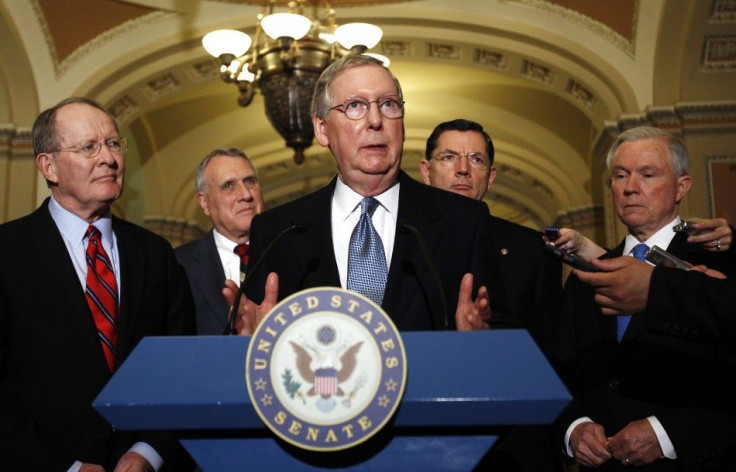S&P Warns of U.S. Downgrade, if no Debt Deal Is Reached

Ratings agency Standard & Poor's, S&P, like Moody's is warning that there is a 50 percent chance it could downgrade the credit rating of the U.S. Government from AAA, if an agreement on raising the debt ceiling is not reached soon.
What's more, S&P put the U.S. on its negative watch, cautioning that it could cut the U.S rating in early as later this month, if talks between President Obama and Congressional Republicans remains remain deadlocked.
John Chambers, the chairman of S&P's sovereign ratings committee, said this is the time for the two sides to tackle the country's long-term debt problems.
If you get a small agreement, that will lead to a downgrade, Chamber told Reuters in an interview.
A downgrade would likely raise borrowing costs for the United States -- working against the Republicans' stated goal of budget deficit reduction, by substantially increasing debt service interest costs -- raand also increase interest rates across-the-commerce-spectrum - commercial paper, home mortgage loans, auto loans, credit cards, and student loan.
That's because, as U.S. Federal Reserve Chairman Ben Bernanke outlined in testimony earlier this week on Capitol Hill, U.S. Government bonds are considered the lowest-risk bond investment class in the world, and serve as a benchmark for interest on other, more-risky bond classes. If investors can't count on the safety of U.S. debt, they would ask for higher interest on those asset classes, pushing up the interest rates in other assets, among other ripple effects.
Further delays in raising the debt ceiling could lead us to conclude that a default is more possible than we previously thought. If so, we could lower the long-term rating on U.S. government this month, S&P said, in statement.
When combined with Moody's credit rating warning Wednesday, policy makes now know if no uncertain terms that a U.S. default or any missed interest payment or principal payment by the U.S. Government will not be an innocuous event.
Fortunately for investors and for others seeking loans, a 'ray of light' has appeared in the debt talks crisis.
On Thursday, Senate Majority Leader Harry Reid, R-Nev., said he is working with Minority Leader Mitch McConnell, R-Ky., on a strategy that would combine McConnell's debt limit increase proposal with at least $1.5 trillion in spending cuts identified by Vice President Joe Biden.s bipartisan deficit reduction committee, The Washington Post reported Thursday.
The deal would create a bipartisan 12-member Congressional committee who would be assigned to identify trillions of dollars in additional savings. The committee's recommendations would be fast-tracked to votes in the House and Senate, and amendments would not be possible. Congress uses a similar process to close military bases. The Reid/MConnell proposal would initially cut the deficit by $1.5 trillon, possibly by as much as $1.7 trillion, with the goal that the committee would identify trillions more in cuts, on a bipartisan basis, in exchange for the debt ceiling raise.
Reid, McConnell, and other Congressional leaders from the Democratic and Republican caucuses are expected to work through the weekend to flesh-out what is considered a 'back-up' deficit ceiling increase plan. McConnell term it a last chance option.
However, If White House neogiators are able to strike a large debt reduction deal, that would take precendence over the Reid/McConnell last-chance effort. Unfortunately, it does not appear likely that White House negotiators will be able to strike an agreement, due to tension between Obama administration officials and the conservative Tea Party wing of the Republican caucus. The obvious rift encouraged McConnell to intervene and jump-start the talks in the Senate.
Political/Public Policy Analysis: McConnell, an experienced public policy professional, sees what the Tea Part faction does not: that if a U.S default occurs, President Obama will not be the only public official blamed for the catastrophe. The GOP will be hit hard in the polls, as well. The Reid/McConnell plan will likely face opposition from House Republicans, but the sense here is that at least half the House Republican caucus will support the plan. Hence, on a scale of 0 to 100 percent, put the likelihood of a U.S. Government default at 30 percent, down from 35 percent Wednesday.
© Copyright IBTimes 2024. All rights reserved.





















